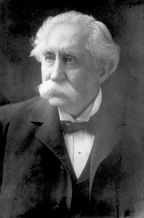 Tennessee native William B. Bate (1826-1905) prior to war proved himself as a young man. Following his first job as a clerk on a steamboat, he then served in the United States Army (during the Mexican-American war), started a newspaper, served in the Tennessee House or Representatives, practiced law, served as attorney general for the Nashville district and became involved in national Democratic politics. He was also a strong advocate of secession immediately prior to the war.
Tennessee native William B. Bate (1826-1905) prior to war proved himself as a young man. Following his first job as a clerk on a steamboat, he then served in the United States Army (during the Mexican-American war), started a newspaper, served in the Tennessee House or Representatives, practiced law, served as attorney general for the Nashville district and became involved in national Democratic politics. He was also a strong advocate of secession immediately prior to the war.
Following the Battle of Fort Sumter in April 1861, Bate enlisted in a Gallatin County private regiment and was elected as captain, becoming a colonel in the 2nd Tennessee Infantry when Tennessee seceded in May. Many battles (including Shiloh and Chickamauga) and several wounds later, Bate today is promoted to Major General, due to his exemplary service in the Chattanooga Campaign.
In the months ahead Bate fights in many more battles (including Atlanta), is wounded yet again, has a horse or two shot out from under him, and in the spring of 1865 takes part in the Carolina Campaign, one of the last major campaigns of the war. By the time he surrenders on April 26, 1865 at the Bennett Farm in North Carolina, he has been wounded three times and had six horses shot out from under him.
Following the war, Bate moves back to Nashville and resumes his law practice and involvement in Democratic politics, gradually gaining in influence within Tennessee political circles. In 1882 he is elected as governor of Tennessee. Serving for five years, he rescues the state from post-Civil War debt and then is elected as a U.S. Senator from Tennessee, serving from 1887 to his untimely death in 1905 from pneumonia, mere days after the second inauguration of President Teddy Roosevelt. Sitting for hours in the inclement weather the day of the inauguration contributed to Bate’s death.
One of the leading Tennessee politicians of the late 19th century, Bate is a Baptist layman. He dies as a member of the First Baptist Church of Nashville.
Sources: “William B. Bate,” Wikipedia (link); “William Brimage Bate (1826-1905),” Tennessee Encyclopedia of History and Culture (link); Governor William Brimage Bate (1826-1905) Papers, Tennessee State Library and Archives (link); William Brimage Bate (late a Senator from Tennessee) Memorial Addresses: Fifty-ninth Congress, Second Session, Senate of the United States, January 17, 1907. House of Representatives, January 20, 1907 (link)


